| You may have heard of antioxidants. Vitamin A, C, and E are great antioxidants. How do they work? They go after "free radicals" and neutralize them. | ||||
| So what are free radicals? They are the bad guys. Free radicals are highly active molecules which damage the genetic material of cells. That alone would be dangerous enough. But free radicals also inhibit the natural repair mechanisms normally used by cells to patch up damaged genes. |  |
|||
| Damage to the genetic code of body cells increases the risk of cancer development. Vitamin A, C, and E reduce your cancer risk, particularly the risk of breast and lung cancer, by acting as antioxidants. | ||||
| Vitamin C is water soluble and heat sensitive. Because it cannot be stored in the body, our diet must provide enough vitamin C every day. | ||||
For long-term storage, freezing is the best method to conserve vitamins. |
When cooking vegetables, use little water and short cooking times. Cooked vegetables should still be crunchy. |
|||
| go to front page | go to next tip | |||

| Vitamin C is beneficial in many ways. It facilitates wound healing and healing of burns, strengthens blood vessel walls to decrease easy bruising, and enhances the absorption of iron. In cancer prevention, vitamin C has several important functions. It inhibits formation of toxic nitrosamines in the stomach, and neutralizes nitrosamines and free radicals, thus protecting cells from damage to their genetic codes. |
|||
| Equally or even more important is its ability to strengthen our immune system. Strong immune systems not only fight viral infections - everybody knows about vitamin C against colds and flu - but also recognize and destroy newly-formed tumor cells. Weak immune systems fail to eradicate these first malignant cells, allowing tumor growth. | ||||
| Foods Rich in Vitamin C |
||||
Black and red currants Kiwis Strawberries Citrus fruits (lemons, limes, oranges and grapefruits) Cantaloupes Melons Berries |
Green and red peppers Tomatoes Lettuce Broccoli Brussels sprouts Cabbage Cauliflower Spinach Potatoes |
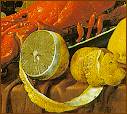 |
||
| go to front page | go to next tip | |||
| Smokers have increased vitamin C requirements! Alcohol consumption enhances the excretion of all water-soluble vitamins (C and B). |
||||
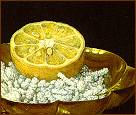 |
Use plenty of colorful vitamin C-rich vegetables (e.g., red and green peppers) to decorate cold cuts. |
Your guests will appreciate the extra vitamin C supply the morning after! |
||
| go to front page | go to next tip | |||
| Vitamins A and E are fat soluble and can be stored in the body. | ||||
 |
Vitamin A is needed for healthy skin. It fosters maturation of skin and mucosal cells, and helps to prevent skin and lung cancer. Vitamin A can decrease the growth rate of certain tumors. It may even be able to reverse the development of these tumors during their earliest stages. Vitamin E inhibits oxidation processes and neutralizes harmful chemical compounds that can induce cancer. |
|||
| Foods Rich in Vitamin A | ||||
| Carrots Sweet potatoes Winter squash Spinach Kale Broccoli Romaine lettuce Tomatoes Red peppers Pumpkins |
Peaches Apricots Nectarines Ruby red grapefruit Cantaloupes Papayas Milk Butter Liver Cod liver Carp |
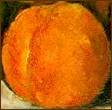 |
go to front page | go to next tip |
| Foods Rich in Vitamin E | ||||
| Whole grain breads and cereals Wheat germ Milk Eggs Fish Vegetable oils Avocado Apples Apricots Nectarines Peaches |
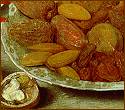 Almonds Hazelnuts Walnuts Pecans Other nuts Sunflower seeds |
Dark-green leafy vegetables are rich in both vitamin A and E.
|
||
| go to front page | go to next tip | |||
| Vitamin D builds and maintains strong bones. Exposure of the skin to sun rays is necessary for the development of vitamin D from its precursor. | ||||
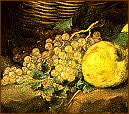
| Vitamin B, which includes B12 and folate, stabilizes membranes and keeps skin and nerve tissues healthy. It is also an essential factor in the production of red blood cells. Recent scientific studies have linked insufficient folate levels in pregnant women to certain defects in embryonic neural development. Vitamin K is necessary for efficient blood clotting in wounds. |
|||
| No connection between these vitamins and cancer has so far been proven, but there are indications that a component of the vitamin B complex might play a role in protection against skin cancer. | ||||
| Meeting your daily vitamin requirements is simple: Eat at least five servings of fruits and vegetables every day, keep variety in mind, and select whole-grain foods. If you are healthy and you stick to a well-balanced diet, you don't need vitamin supplements. If not, ask your doctor's advice. |
||||
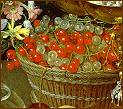 |
Natural sources of vitamins are not only safer than supplements but also more efficient in preventing cancer. Scientific investigations have shown that artificial antioxidants offer much less protection against cancer than their natural counterparts. | |||
| If you cannot manage to regularly eat a balanced diet which contains enough vitamins, you may have to opt for second best and take a vitamin supplement. |
|
|||
| go to art gallery | go to front page | go to next tip | ||
| e-mail to
fritel3@akh-wien.ac.at
|